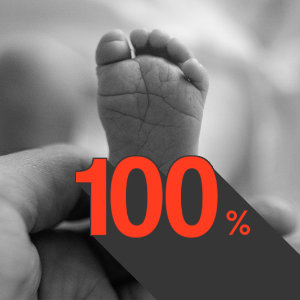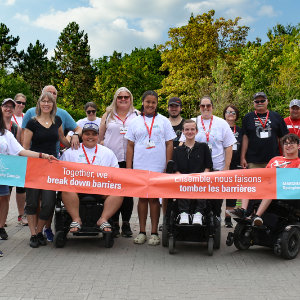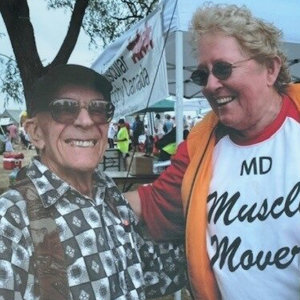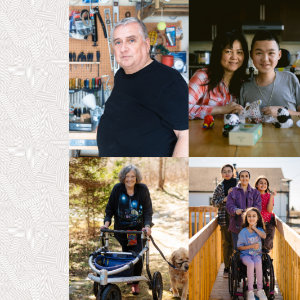Muscular Dystrophy Canada is thrilled to announce that after three years of working with each Canadian province and territory, all babies born in Canada can now be tested for spinal muscular atrophy (SMA). This milestone means infants diagnosed with SMA, the most fatal genetic disorder in children under two years of age, can receive life-changing treatment before symptoms even develop. It also marks the first neuromuscular condition to be added to screening panels across the country.
“Early diagnosis and effective treatment are critical to achieving the best possible outcomes for babies born with this neuromuscular condition,” said Dr. Pranesh Chakraborty , Chief of the Department of Pediatrics at Children’s Hospital of Eastern Ontario and Chair of the Department of Pediatrics at uOttawa’s Faculty of Medicine. “Historically, most infants and children with SMA would have been diagnosed only after they have developed weakness and respiratory difficulty, at a time when most of their motor neurons have been irretrievably lost. Now, instead of facing life-limiting disability and, in the most severe cases, a life expectancy of less than two years, babies affected by SMA every year in Canada shall be diagnosed within the first weeks of life allowing them to rapidly receive therapy and improved outcomes.”
The addition of SMA to newborn screening panels in all provinces and territories breaks down barriers and inequities families face simply because of where they live. It also acknowledges that screening for rare genetic diseases and access to early care result in positive health outcomes and long-term cost benefits for everyone. This is a tremendous accomplishment to start improving early detection and prevention.
We are so grateful for the partnership with Novartis Pharmaceuticals Canada, who helped us make this a reality across Canada. And a very special thank you to our dedicated community, generous donors and sponsors, Fire Fighter partners, clinicians, clients, and advocates for your unwavering support. We have helped make a life-changing impact on newborns and their families nationwide. We did it together—thank you!
For more information on this and other advocacy initiatives, please reach out through the research Hotline at 1-800-567-2873 ext. 114 or via email at research@muscle.ca.
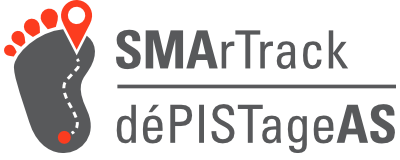
Was your child diagnosed with SMA through newborn screening?
If so, we offer a specialized program called SMArTrack to help monitor, assess, and provide answers during the first two years of their life. For more information, or to get involved, please reach out to research@muscle.ca.
The 2024 Walk & Roll for Muscular Dystrophy Canada was a huge success thanks to you!
The Walk & Roll for Muscular Dystrophy Canada 2024 season is officially over, and it was a huge success, raising more than $1,089,000! Through 30 in-person events, we hosted more than 2,200 registered participants who joined us for fun-filled days, that helped break down the barriers faced by our neuromuscular community.
These special community events would not have been possible without the support of dedicated volunteers. We are so grateful to the 225 dedicated volunteers from across the country who donated their talent, skills and time totalling 1,000 volunteer hours to help make these amazing events the best they could be. Their hard work and enthusiasm helped create amazing events, and we are deeply thankful for their unwavering support and commitment to making a difference. Thank you!
This year, through a new initiative, we were thrilled to also support many individuals, groups, and schools with hosting their own Walk & Roll events in their local communities. These dedicated community members turned their commitment to breaking down barriers for the neuromuscular community into positive change by organizing, promoting and hosting their own Walk & Roll events. Thank you for your dedication and great work!
Thank you to all participants, donors, sponsors, volunteers, and everyone who participated, fundraised or attended a Walk & Roll for Muscular Dystrophy Canada event this year. Because of your hard work and dedication, Canadians affected by a neuromuscular disorder can continue to count on Muscular Dystrophy Canada for supportive programs and services, while we continue to fund ground-breaking research and champion advocacy efforts on their behalf. Thank you for making a difference and we hope to see you all again at next year’s Walk & Roll!
For more information on the Walk & Roll for Muscular Dystrophy Canada, visit walkrollmdc.ca.
Donor support makes a difference
When Sally and Cy Elston were approached by their longtime friend, Lloyd Lawrence, about supporting Muscular Dystrophy Canada, they rose to the challenge. Initially supporting a Dragon Boat Race fundraiser in Barrie, Ontario, their support has evolved over many years.
Now, Sally has continued the tradition they began together through her generous gifts to Muscular Dystrophy Canada. When asked why, Sally is clear. “It’s about people”, she says. “And the joy of knowing you are doing something for others”. While Cy passed away 15 years ago, Sally has remained steadfast in prioritizing philanthropic opportunities, “where (she) can do the most good for lovely people”.
Support from donors, like Sally, helps to eliminate the barriers that keep the neuromuscular community from reaching their full potential. Thank you for supporting our life-changing work. Every dollar matters and every donation is powerful!
Muscular Dystrophy Canada’s Annual Report is now available
2023-2024 marked another year of Muscular Dystrophy Canada “Breaking Down Barriers” for the Canadian neuromuscular community. If you would like to review Muscular Dystrophy Canada’s 2023-2024 Annual Report, please visit here.
Lise Poulin, Board Member and Stacey Lintern, CEO share highlights from Muscular Dystrophy Canada’s 2023–2024 Annual Report.
Clinical Trials in Canada for Neuromuscular Disorders Are on the Rise
In recent years, the number of clinical trials available in Canada for individuals with neuromuscular disorders has increased significantly, with opportunities doubling or even tripling in some cases. This is exciting news for people affected by neuromuscular disorders and their families as more trials mean greater access to emerging treatments, innovative research, and, potentially, life-changing therapies.
Clinical trials are research studies that explore new medical treatments, drugs, or therapies to determine their effectiveness and safety. These trials follow strict protocols and are essential in bringing new treatments to market. Clinical trials happen in phases, each with a distinct purpose. Early-phase trials (Phase 1) focus on safety and dosage, while later phases (Phase 2 and 3) explore the treatment’s effectiveness in larger groups. The more advanced the phase, the closer the trial is to delivering real-world treatments, with Phase 3 often being the final step before approval.
For individuals with neuromuscular disorders, participating in a clinical trial can offer access to cutting-edge treatments that are not yet widely available. The value of participating in a clinical trial extends beyond access to new treatments. Clinical trials contribute to medical knowledge that can lead to breakthroughs and better outcomes for future generations. By participating, individuals play an active role in their healthcare and help advance research that could lead to the development of a cure.
However, participating in clinical trials requires courage, grit, and a willingness to contribute to the scientific community. It often involves uncertainty, dedication, and perseverance, but it also means becoming a part of the journey to uncover new therapies and treatments that could one day transform care for all affected by neuromuscular disorders.
Navigating Clinical Trials: It’s Not Always Straightforward
While more trials are now available, navigating the clinical trial landscape can be complex. In some cases, like with Duchenne muscular dystrophy, there may be multiple trials available at the same time, each testing different treatments or approaches. Deciding which trial is right for you or your loved one can be challenging. Factors like trial eligibility criteria, location, and the type of intervention being tested must all be considered.
Muscular Dystrophy Canada Can Help
At Muscular Dystrophy Canada, we understand the importance of making informed decisions when it comes to clinical trials. We are here to help by sharing the latest clinical trials for various neuromuscular disorders and can provide timely information on available trials. We can help you find trials that match your specific condition, location, and eligibility criteria. Muscular Dystrophy Canada can assist in reaching out to trial coordinators and investigators to get answers to important questions about trial details, participation requirements, and more. We can also support families in interpreting clinical trial data, helping to make well-informed decisions.
If you’re curious about clinical trials and want to explore whether one might be right for you or your loved one, please contact research@muscle.ca.
Opening Doors: Navigating University with Neuromuscular Conditions
Choosing the right university or college is always a big decision, filled with considerations about programs, campus life, and future goals. But for students living with neuromuscular conditions, the decision becomes even more complex, as accessibility and support services are crucial to their academic success and well-being. The problem? There isn’t a centralized place where students can easily find information about the services, supports, and accommodations available at post-secondary institutions across Canada.
To address this gap, Muscular Dystrophy Canada is collecting data on a wide range of accessibility aspects, including physical spaces such as accessible classrooms and building, note-taking services and support for class materials, class structure and accommodations tailored to individual needs, residence options that cater to accessibility and personal care needs, transportation availability to and from campus, testing and exam accommodations for fair assessment, and washroom facilities and other essential amenities for universities and colleges across Canada.
What We Heard
In addition to gathering this data, Muscular Dystrophy Canada connected with students living with neuromuscular disorders who are currently enrolled in post-secondary institutions. We learned that:
- Many students are restricted in their selection of institutions due to their medical and accessibility needs.
- While some accommodations, like note-taking services meet basic needs, many students have additional unmet needs that negatively impact their academic performance and overall success.
- Inadequate accommodations provided by universities and colleges force students to pay out-of-pocket for extra support, adding a significant financial burden.
- Students with neuromuscular conditions often find there is limited financial assistance specifically tailored to their unique circumstances.
- Many university and college accessibility services lack sufficient knowledge about neuromuscular conditions, which limits the support available.
- Attendant care services are a critical and valuable resource that significantly enhances the experience of students with neuromuscular conditions. These services provide essential daily living support.
If you or someone you know is attending a post-secondary institution while managing a neuromuscular condition, Muscular Dystrophy Canada is here to help. We are dedicated to connecting you with the right resources and providing the information and support you need to reach your academic goals. Plus, thanks to the generosity of our donors, funds may be available to support post-secondary students—reach out to research@muscle.ca to learn more!

